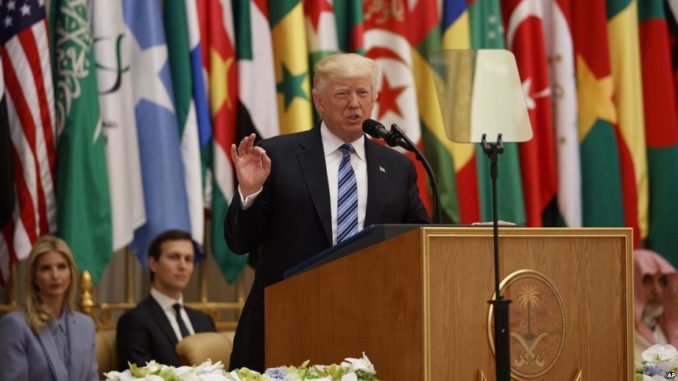
President Donald Trump urged Arab and Islamic leaders on Sunday to unite and do their share to defeat Islamist extremists, making an impassioned plea to “drive out” terrorists while toning down his own harsh rhetoric about Muslims.
Trump singled out Iran as a key source of funding and support for militant groups. His words aligned with the views of his Saudi Arabian hosts and sent a tough message to Tehran the day after Hassan Rouhani won a second term as Iran’s president.
The U.S. president did not use his signature term “radical Islamic terrorism,” a signal that he decided to employ a more moderate tone in the region after using the phrase repeatedly as a presidential candidate.
“Terrorism has spread all across the world. But the path to peace begins right here, on this ancient soil, in this sacred land,” Trump told leaders from dozens of Muslim majority countries representing more than a billion people.
“A better future is only possible if your nations drive out the terrorists and drive out the extremists. Drive them out. Drive them out of your places of worship, drive them out of your communities, drive them out of your holy land and drive them out of this earth.”
The president’s first speech abroad provided an opportunity to show his strength and resolve, in contrast to his struggle to contain a mushrooming scandal at home after his firing of former FBI director James Comey nearly two weeks ago.
With a forceful tone, he made clear that Washington would partner with the Middle East but expected more action in return.
“There is still much work to be done. That means honestly confronting the crisis of Islamic extremism, and the Islamists, and Islamic terror of all kinds,” he said in his speech.
The speech in a gilded hall bedecked with chandeliers is part of an effort to redefine his relationship with the Muslim world after Trump frequently attacked Muslims on the campaign trail last year and tried to ban many from entering the United States.
Trump received a warm welcome from Arab leaders, who set aside his campaign rhetoric about Muslims and focussed on his desire to crack down on Iran’s influence in the region, a commitment they found wanting in Obama.
Trump’s signature phrase “radical Islamic terrorism” was not included in the speech, according to excerpts released in advance by the White House.
Instead, he used the term “Islamist extremism”, which refers to Islamism as political movement rather than Islam as a religion, a distinction that he had frequently criticized the administration of his predecessor Barack Obama for making.
As a candidate, Trump proposed temporarily banning Muslims from entering the United States. In office he ordered temporary bans on people from certain Muslim-majority countries, which have been blocked by courts that ruled they were discriminatory.
JOINT FIGHT, ROYAL WELCOME
Introducing Trump, Saudi King Salman described their mutual foe Iran as the source of terrorism they must confront together.
“Our responsibility before God and our people and the whole world is to stand united to fight the forces of evil and extremism wherever they are … The Iranian regime represents the tip of the spear of global terrorism.”
Iran is a Shi’ite Muslim country. The groups that the United States has been fighting in Afghanistan, Iraq and elsewhere since the September 11, 2001 attacks on Washington and New York are mostly Sunni Muslims, and enemies of Iran.
The United States and Gulf Arab countries announced agreement to coordinate efforts against the financing of terrorist groups.
Trump’s welcome in the region was put on display during a series of individual meetings with Arab leaders.
He praised Egyptian President Abdel Fattah al-Sisi, telling him, “You have done a tremendous job under trying circumstances”. The Obama administration had a difficult relationship with Sisi, who came to power after leading a military coup in 2013 during which hundreds of demonstrators were killed, and has since jailed thousands of opponents.
Trump promised to schedule a trip to Egypt soon, and he singled out the Egyptian’s choice of footwear, a pair of shiny black shoes. “Love your shoes. Boy, those shoes,” he said.
To Bahrain’s King Hamad bin Isa al-Khalifa, Trump declared that the two nations had a lot in common and “there won’t be strain with this administration.”
The king lauded the relationship and said it had led to “great stability in the region and prosperity”. Bahrain is home to the U.S. fleet in the Middle East. Its Sunni Muslim royal family rules over a majority Shi’ite population and was occasionally rebuked by the Obama administration for harsh treatment of opponents.
Trump’s Riyadh visit kicks off his first presidential trip abroad, with Saudi Arabia the first stop on a nine-day journey through the Middle East and Europe.
The speech came as Trump tried to escape the fallout from his May 9 firing of former FBI Director James Comey amid accusations he was trying to stop a federal investigation into his campaign’s ties with Russia last year.
The New York Times reported Trump called Comey a “nut job” in a meeting with Russian Foreign Minister Sergei Lavrov last week. The Washington Post said the probe had reached into the White House to include a Trump adviser, who was not named.
Source – Reuters